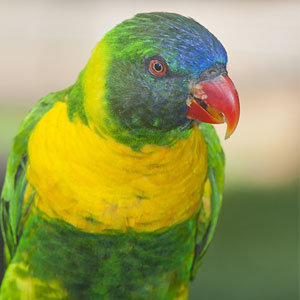
Fatty Liver Disease in Birds
Obesity is one of the biggest health concerns in pet birds, and one of the most common health problems associated with obesity is fatty liver disease. This disease causes large amounts of fat to be deposited in the liver. When the normal liver cells are replaced with fat, the liver eventually loses the ability to function properly. This serious condition is most common in Cockatoos, Cockatiels, Budgies, Amazons, Lovebirds, and Quakers.
Causes
Fatty liver disease, also known as hepatic lipidosis, has several possible causes, including a nutritional deficiency, a diet high in fat, overindulgence, thyroid disease, genetics, and diabetes.Symptoms
There are several different signs that a bird has fatty liver disease. Some signs include lethargy, depression, loss of appetite, overgrown beaks, difficulty breathing, diarrhea, and abnormal or unhealthy looking feathers. Because a bird's liver literally replaces itself with fat, the liver usually becomes enlarged.Fatty Liver Treatment in Birds
If a bird is diagnosed with fatty liver disease, the treatment will probably involve a diet and lifestyle change. Birds should be switched to a low-fat diet because a seed-only diet does not provide adequate nutrition for a bird. Often, a low-fat diet involves an extruded food, plus fresh fruit and vegetables. Supportive care might also be needed.Prevention
Because fatty liver disease is a serious and fatal condition, prevention is the best way to protect your bird. Prevention includes a balanced, nutritious diet and plenty of exercise. Proper nutrition for a bird includes variety and the right balance of certain foods. Feeding birds only seeds or treats is not healthy and will not provide them with adequate nutrition.To solve malnutrition issues, choose an extruded food for the base of a bird's diet. These foods are already balanced with grains, seeds, vegetables, and fruits, plus they are fortified with vitamins and minerals. Then supplement the bird's diet with fresh fruits, vegetables, treats, and seeds.
It is also important for birds to receive plenty of activity and exercise. You can help prevent inactivity and obesity by providing your bird with fun exercise options. Encourage your bird to climb, walk, and play with toys. These activities will reduce boredom, keep birds at a healthy weight, and lessen the chance of disease.
Discover More!
How to Switch Your Bird From Seeds to PelletsImportant Vitamins and Minerals for Pet Birds
Pet Bird Nutrition
The Necessity of Exercie for Birds
Obesity in Birds
Return to Bird Articles


